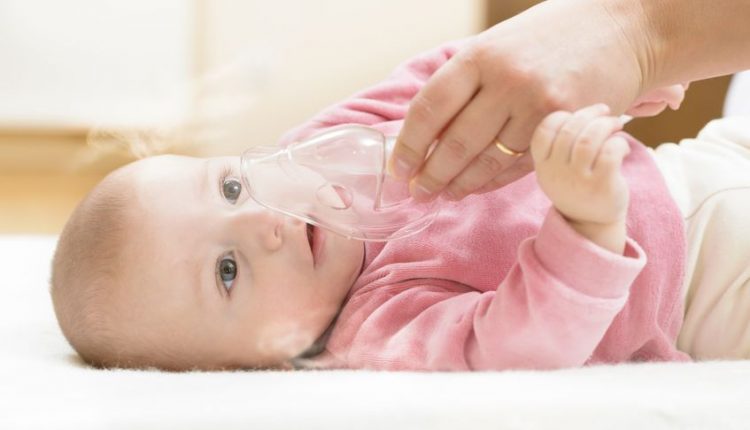
Symptoms of bronchiolitis in infants and children. How is it treated?
Colds, coughing and laboured breathing in very young children can be the hallmarks of bronchiolitis
It is a viral infection involving the end part of the bronchi, the so-called terminal bronchioles, causing inflammation and congestion.
It affects children under 2 years of age with most cases occurring in the first year of life (in some cases it is referred to as infant bronchiolitis).
CHILD HEALTH: LEARN MORE ABOUT MEDICHILD BY VISITING THE BOOTH AT EMERGENCY EXPO
Causes of bronchiolitis
The contagion is due to a virus, as is the case with a common cold, with which it shares seasonality: the period of the year when bronchiolitis is most common is, in fact, winter, from November to March.
The respiratory syncytial virus (VRS) is the main cause of bronchiolitis but other viruses may also be involved, including influenza, parainfluenza, adenoviruses and metapneumoviruses.
These microorganisms in most older children and adults give nothing more than a trivial cold or flu-like symptoms; in very young children, however, they can trigger bronchiolitis in infants.
Symptoms of bronchiolitis
The symptoms of bronchiolitis are very similar to those of a cold – stuffy nose, mucus and sneezing – but bronchiolitis has a fast course and degenerates within a few hours.
Sometimes two or three are enough for breathing to become laboured, accelerated and noisy with peculiar whistling or hissing, accompanied by coughing.
Bronchiolitis: the diagnosis
All that is needed to diagnose bronchiolitis is a thorough paediatric examination, perhaps supplemented by measuring the oxygen saturation of the little finger.
Taking into account the child’s age, the seasonality of viruses and the detection of signs of respiratory fatigue, bronchiolitis can be diagnosed and appropriate therapy prescribed.
X-rays may be useful when the picture is particularly severe or there are no signs of improvement, or when there is a well-founded suspicion of respiratory complications, such as pneumonia, for which further treatment must be initiated.
Treatment for bronchiolitis
In most cases the disease resolves spontaneously within a few days thanks to a little extra attention from mum and dad.
This is the most effective treatment for bronchiolitis.
The recommendations are simple: keep the nose clear by means of appropriate washing and suction and ensure that the little one feeds and hydrates by mouth normally.
Hospitalisation is rare and is only required for the most severe cases.
Read Also
Emergency Live Even More…Live: Download The New Free App Of Your Newspaper For IOS And Android
Bronchial Asthma: Symptoms And Treatment
Bronchitis: Symptoms And Treatment
Bronchiolitis: Symptoms, Diagnosis, Treatment
Chest Pain In Children: How To Assess It, What Causes It
Bronchoscopy: Ambu Set New Standards For Single-Use Endoscope
Respiratory Distress: What Are The Signs Of Respiratory Distress In Newborns?
Respiratory Distress Syndrome (ARDS): Therapy, Mechanical Ventilation, Monitoring
Bronchiolitis: Symptoms, Diagnosis, Treatment
Chest Pain In Children: How To Assess It, What Causes It
Bronchoscopy: Ambu Set New Standards For Single-Use Endoscope
Bronchiolitis In Paediatric Age: The Respiratory Syncytial Virus (VRS)
Bronchiolitis In Infants: Symptoms
What Is Chronic Obstructive Pulmonary Disease (COPD)?
Respiratory Syncytial Virus (RSV): How We Protect Our Children
Respiratory Syncytial Virus (RSV), 5 Tips For Parents
Infants’ Syncytial Virus, Italian Paediatricians: ‘Gone With Covid, But It Will Come Back’
Symptoms Of Emergencies In Children: Fever
What Is Traumatic Brain Injury (TBI)?
Paediatric Toxicological Emergencies: Medical Intervention In Cases Of Paediatric Poisoning
Paediatric Seasonal Illnesses: Acute Infectious Rhinitis
Pediatrics: What To Do In Case Of High Fever In Children?
Seasonal Illnesses: What To Eat When You Have Flu?
Plaques In The Throat: How To Recognise Them
Tonsillitis: Symptoms, Diagnosis And Treatment
Sore Throat: How To Diagnose Strep Throat?
Sore Throat: When Is It Caused By Streptococcus?
Pharyngotonsillitis: Symptoms And Diagnosis
Flu Vaccine For Children? Paediatricians: ‘Do It Now, Epidemic Already Started’
Paediatrics / Recurrent Fever: Let’s Talk About Autoinflammatory Diseases
Q Fever: What It Is, How To Diagnose It And How To Treat It
Respiratory Allergies: Symptoms And Treatment
RSV (Respiratory Syncytial Virus) Surge Serves As Reminder For Proper Airway Management In Children
Acute And Chronic Sinusitis: Symptoms And Remedies
Symptoms And Remedies Of Allergic Rhinitis
Respiratory Or Food Allergies: What Is The Prick Test And What Is It For?
Anaphylactic Shock: What It Is And How To Deal With It
Sinusitis: How To Recognise That Headache Coming From The Nose
Sinusitis: How To Recognise And Treat It
Flu Vaccine For Children? Paediatricians: ‘Do It Now, Epidemic Already Started’
Rhinitis, Inflammation Of The Nasal Mucous Membranes
High Fever In Children: What Is Important To Know



